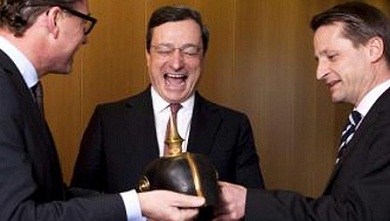How else can we describe Thusday’s meeting of the council of the European Central Bank? It acknowledged that the health of our economy is precarious and entering recession, and that credit continues being frozen, and yet no new monetary measures were announced.
Not everybody in Spain knows who Mario Draghi is. But many have already come to the conclusion that the Bank of Spain’s role has been dramatically diminished: it was left with the duties over regulation and supervision, and the Spanish central bank has stupendously failed in both. It is Draghi, the governor of the ECB, who now retains more power than the crown, the presidency or the Economy minister of Spain. However, he only obeys the Bundesbank.
Draghi admitted yesterday that the real economy is in contraction and that we must wait until next year to see the firsts signs of recovery. Where? He didn’t say, although the central bank did cut down its already negative September forecast. Worse, it did not agree on lower interest rates. Draghi was, at best, incoherent.
“Let me now explain our assessment in greater detail, starting with the economic analysis. Following a contraction of 0.2%, quarter on quarter, in the second quarter of 2012, euro area real GDP declined by 0.1% in the third quarter. Available statistics and survey indicators continue to signal further weakness in activity in the last quarter of the year, although more recently some indicators have stabilised at low levels and financial market confidence has improved further. Over the shorter term, weak activity is expected to extend into next year, reflecting the adverse impact on domestic expenditure of weak consumer and investor sentiment and subdued foreign demand. A gradual recovery should start later in 2013 as our accommodative monetary policy stance and significant improvement in financial market confidence work their way through to private domestic expenditure, and a strengthening of foreign demand should support export growth.”
Behold, though, here come the caveats…
“The Governing Council continues to see downside risks to the economic outlook for the euro area. These are mainly related to uncertainties about the resolution of sovereign debt and governance issues in the euro area, geopolitical issues and fiscal policy decisions in the United States possibly dampening sentiment for longer than currently assumed and delaying further the recovery of private investment, employment and consumption.”
So why on Earth should they bring interest rates down?
“According to Eurostat’s flash estimate, euro area annual HICP inflation fell to 2.2% in November 2012, down from 2.5% in October and from 2.6% in the two previous months. On the basis of current futures prices for oil, inflation rates are expected to decline further to below 2% next year. Over the policy-relevant horizon, in an environment of weak economic activity in the euro area and well-anchored long-term inflation expectations, underlying price pressures should remain moderate.
“This assessment is also reflected in the December 2012 Eurosystem staff macroeconomic projections for the euro area, which foresee annual HICP inflation of 2.5% for 2012, between 1.1% and 2.1% for 2013 and between 0.6% and 2.2% for 2014. Compared with the September 2012 ECB staff macroeconomic projections, the projection range for 2013 has been revised downwards.”
And the last straw: an official bailout request by Spain would now be an insufficient condition for the ECB to activate its short-term sovereign debt purchases in support of cheaper credit costs.
“First, let me tell you what Mr Constâncio meant. We have all always said that we would not tell governments what to do when it comes to the OMT. So it is up to the governments to decide what to do. They know what the conditions are. They know they will have to have in place either a full EFSF/ESM macroeconomic adjustment programme or a precautionary programme. This is a necessary, but not a sufficient condition. The ECB will then carry out its independent assessment, which applies not only to Spain but also to any other country.”
Does Draghi expect the Spanish government to willingly play Russian roulette? Is this a serious manner in which to deal with a financial and economic crisis engulfing the whole continent? I despair.






Be the first to comment on "Draghi’s inconceivable cynicism"